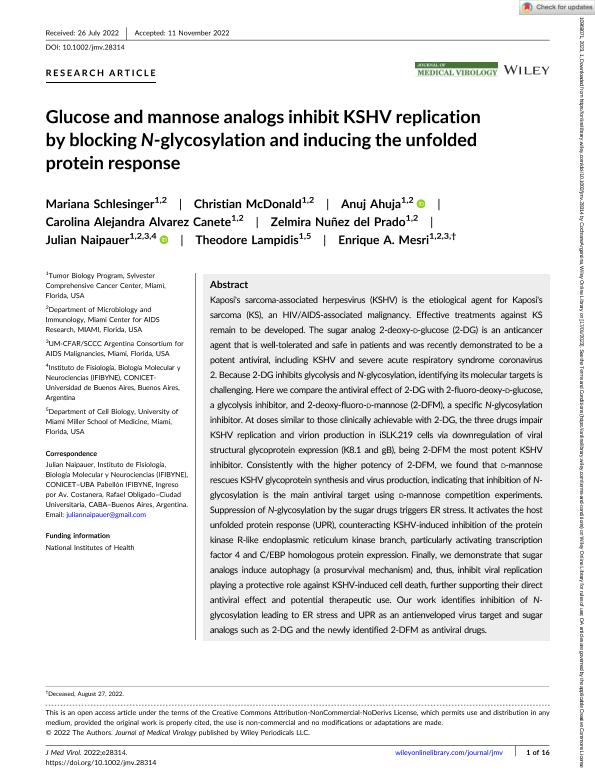Artículo
Glucose and mannose analogs inhibit KSHV replication by blocking N-glycosylation and inducing the unfolded protein response
Schlesinger, Mariana ; McDonald, Christian; Ahuja, Anuj; Alvarez Canete, Carolina Alejandra; Nuñez del Prado, Zelmira; Naipauer, Julian
; McDonald, Christian; Ahuja, Anuj; Alvarez Canete, Carolina Alejandra; Nuñez del Prado, Zelmira; Naipauer, Julian ; Lampidis, Theodore; Mesri, Enrique Alfredo
; Lampidis, Theodore; Mesri, Enrique Alfredo
 ; McDonald, Christian; Ahuja, Anuj; Alvarez Canete, Carolina Alejandra; Nuñez del Prado, Zelmira; Naipauer, Julian
; McDonald, Christian; Ahuja, Anuj; Alvarez Canete, Carolina Alejandra; Nuñez del Prado, Zelmira; Naipauer, Julian ; Lampidis, Theodore; Mesri, Enrique Alfredo
; Lampidis, Theodore; Mesri, Enrique Alfredo
Fecha de publicación:
01/2023
Editorial:
Wiley-liss, div John Wiley & Sons Inc.
Revista:
Journal of Medical Virology
ISSN:
0146-6615
Idioma:
Inglés
Tipo de recurso:
Artículo publicado
Clasificación temática:
Resumen
Kaposi's sarcoma-associated herpesvirus (KSHV) is the etiological agent for Kaposi's sarcoma (KS), an HIV/AIDS-associated malignancy. Effective treatments against KS remain to be developed. The sugar analog 2-deoxy- d-glucose (2-DG) is an anticancer agent that is well-tolerated and safe in patients and was recently demonstrated to be a potent antiviral, including KSHV and severe acute respiratory syndrome coronavirus 2. Because 2-DG inhibits glycolysis and N-glycosylation, identifying its molecular targets is challenging. Here we compare the antiviral effect of 2-DG with 2-fluoro-deoxy- d-glucose, a glycolysis inhibitor, and 2-deoxy-fluoro- d-mannose (2-DFM), a specific N-glycosylation inhibitor. At doses similar to those clinically achievable with 2-DG, the three drugs impair KSHV replication and virion production in iSLK.219 cells via downregulation of viral structural glycoprotein expression (K8.1 and gB), being 2-DFM the most potent KSHV inhibitor. Consistently with the higher potency of 2-DFM, we found that d-mannose rescues KSHV glycoprotein synthesis and virus production, indicating that inhibition of N-glycosylation is the main antiviral target using d-mannose competition experiments. Suppression of N-glycosylation by the sugar drugs triggers ER stress. It activates the host unfolded protein response (UPR), counteracting KSHV-induced inhibition of the protein kinase R-like endoplasmic reticulum kinase branch, particularly activating transcription factor 4 and C/EBP homologous protein expression. Finally, we demonstrate that sugar analogs induce autophagy (a prosurvival mechanism) and, thus, inhibit viral replication playing a protective role against KSHV-induced cell death, further supporting their direct antiviral effect and potential therapeutic use. Our work identifies inhibition of N-glycosylation leading to ER stress and UPR as an antienveloped virus target and sugar analogs such as 2-DG and the newly identified 2-DFM as antiviral drugs.
Archivos asociados
Licencia
Identificadores
Colecciones
Articulos(IFIBYNE)
Articulos de INST.DE FISIOL., BIOL.MOLECULAR Y NEUROCIENCIAS
Articulos de INST.DE FISIOL., BIOL.MOLECULAR Y NEUROCIENCIAS
Citación
Schlesinger, Mariana; McDonald, Christian; Ahuja, Anuj; Alvarez Canete, Carolina Alejandra; Nuñez del Prado, Zelmira; et al.; Glucose and mannose analogs inhibit KSHV replication by blocking N-glycosylation and inducing the unfolded protein response; Wiley-liss, div John Wiley & Sons Inc.; Journal of Medical Virology; 95; 1; 1-2023; 1-16
Compartir
Altmétricas



